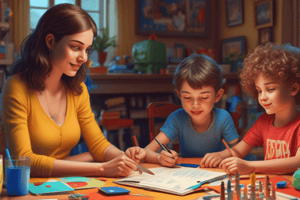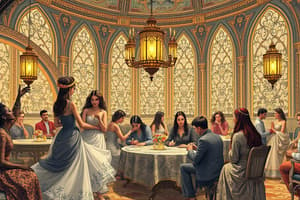Podcast
Questions and Answers
What is the primary function of law enforcement agencies?
What is the primary function of law enforcement agencies?
- To provide social services to communities
- To educate the public about health and safety
- To maintain order and enforce laws (correct)
- To regulate economic policies
Which formal agency is tasked with interpreting laws and determining guilt or innocence?
Which formal agency is tasked with interpreting laws and determining guilt or innocence?
- Courts and legal systems (correct)
- Military
- Law enforcement agencies
- Correctional institutions
Correctional institutions primarily serve what purpose?
Correctional institutions primarily serve what purpose?
- To punish and rehabilitate convicted individuals (correct)
- To prevent future environmental harm
- To provide counseling services
- To promote community engagement
Which formal agency of social control is responsible for national security?
Which formal agency of social control is responsible for national security?
What do government agencies such as the FDA regulate?
What do government agencies such as the FDA regulate?
Which of the following is NOT considered an informal agency of social control?
Which of the following is NOT considered an informal agency of social control?
What is the primary purpose of social control in society?
What is the primary purpose of social control in society?
How do peer groups exert influence on social behavior?
How do peer groups exert influence on social behavior?
What role do religious institutions play in social control?
What role do religious institutions play in social control?
Which agency is likely to promote social values through formal curricula?
Which agency is likely to promote social values through formal curricula?
What type of reinforcement can family members provide to encourage conformity?
What type of reinforcement can family members provide to encourage conformity?
In what way do community organizations help with social control?
In what way do community organizations help with social control?
How does media and popular culture influence social norms?
How does media and popular culture influence social norms?
Flashcards are hidden until you start studying
Study Notes
Social Control
- Social Control is the process by which societies maintain order, regulate behavior, and enforce conformity to social norms and values. It is the means by which individuals and groups are compelled to act in accordance with established norms, rules, and laws.
Agencies of Social Control
- Agencies of Social Control are the formal and informal institutions and mechanisms used to regulate behavior and enforce conformity to social norms and values.
Informal Agencies of Social Control
-
Family and Friends: Family members and close friends exert significant social pressure to conform to social norms and values through positive and negative reinforcement.
-
Peer Groups: Peer groups are a powerful influence on social behavior, particularly during adolescence, using peer pressure to enforce conformity to social norms and discourage deviant behavior.
-
Religion: Religious institutions provide guidance and support to individuals, promoting social values and norms. Religious beliefs and practices act as a mechanism to regulate behavior, especially regarding moral and ethical issues.
-
Education and Schools: Education and schools promote socialization and cultural value transmission. Teachers, coaches, and other educators act as informal agents of social control by enforcing rules and regulations within the school environment.
-
Community Organizations: Community organizations like neighborhood associations and civic groups promote and enforce social norms and values within a local community.
-
Media and Popular Culture: Media and popular culture shape and reflect societal values and norms through messages and images. They can be used to promote or discourage certain behaviors.
-
Informal Agencies of Social Control play a vital role in behavior regulation and enforcement of social norms. However, they can also be used to enforce unjust or discriminatory practices, particularly if they reflect the dominant power structure within society.
Formal Agencies of Social Control
-
Law Enforcement Agencies: Law enforcement agencies like the police maintain public order, enforce laws and regulations, and use physical force and coercion to apprehend and punish individuals who disobey the law.
-
Courts and Legal Systems: Courts interpret laws, determine guilt or innocence in legal cases, and punish convicted criminals.
-
Correctional Institutions: Correctional institutions, such as prisons and juvenile detention centers, punish individuals convicted of crimes and aim to prevent future criminal behavior.
-
Government Agencies: Government agencies like the Federal Board of Revenue, Food and Drug Administration (FDA), and the Environmental Protection Agency (EPA), regulate and enforce laws and regulations in specific areas like taxes, food and drug safety, and environmental protection.
-
Military: The military is a formal agency of social control that is responsible for protecting the nation's security and interests through the use of force.
-
Formal Agencies of Social Control are essential for maintaining social order and regulating behavior. However, they can also be used to enforce unjust or discriminatory practices if they reflect the dominant power structure within society. It is crucial to ensure that these agencies remain fair, just, and equitable in dealing with individuals and groups.
Studying That Suits You
Use AI to generate personalized quizzes and flashcards to suit your learning preferences.




